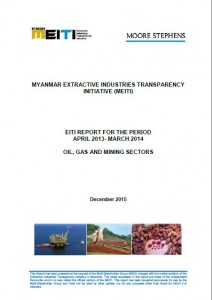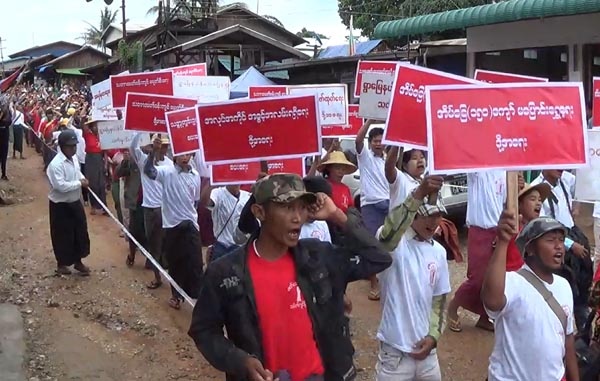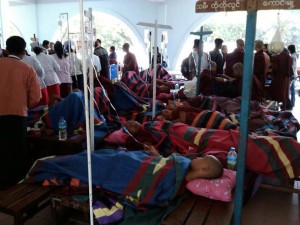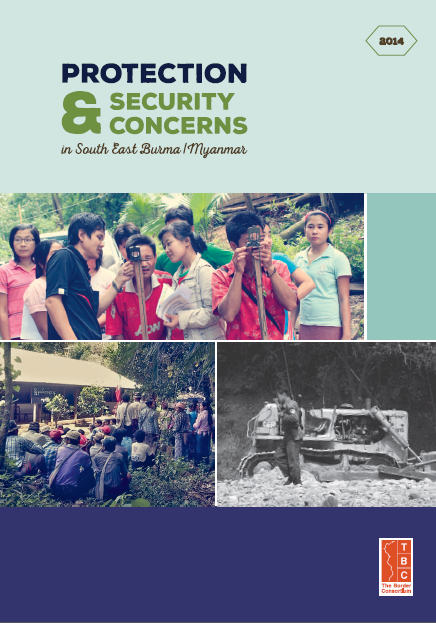Posts Tagged ‘Mining’ (28 found)
Myanmar Extractive Industries Transparency Initiative (MEITI) Report for the period April 2013- March 2014 Oil, Gas and Mining Sectors
 The purpose of this Report is to reconcile the data provided by companies operating in the extractive sector (hereafter referred to as “Companies”) with the data provided by relevant Government Ministries and Bodies (hereinafter referred to as “Government Bodies”) […]
The purpose of this Report is to reconcile the data provided by companies operating in the extractive sector (hereafter referred to as “Companies”) with the data provided by relevant Government Ministries and Bodies (hereinafter referred to as “Government Bodies”) […]
Protection and Security Concerns in South East Burma/ Myanmar
The peace process in Burma/Myanmar1 is at a critical juncture from which it could evolve into a transformative national dialogue or splinter into a divisive charade. While hopes for substantive and inclusive discussion about structural injustice remain, ongoing militarisation and attacks by the national armed forces2 are undermining the confidence of ethnic stakeholders. This report seeks to highlight the protection and security concerns of conflict-affected communities. […]
• • •Namkham Farmers’ Protest Highlights Urgent Need for Moratorium on Resource Extraction during Peace Process
The anti-mining protest by over 3,000 villagers in Namkham, northern Shan State, on September 5, 2014, highlights the lack of protection against damaging mining, and the urgent need for a moratorium on resource extraction in ethnic areas until there is genuine political reform and peace in Burma […]
• • •Over 1,000 in Mandalay Protest Mining Activities
 The mining sector in Burma continues to receive flak, with protestors taking to the streets in Wetthay and Phetshay villages in Thabeikkyin, Mandalay.
The mining sector in Burma continues to receive flak, with protestors taking to the streets in Wetthay and Phetshay villages in Thabeikkyin, Mandalay.
On 30 August, the villagers protested against the encroaching mining activities on village land and the displacement of more than 150 households. Aimed at gold mining companies such as Myanmar Golden Pwint, Shwe Pyi Thar and Htarwarra, along with other metal mining companies in the region, the protestors condemned the breaching of boundary lines by these companies and expanding mining activities onto legally recognized village land […]
• •Thai Oversea Investment on Coal Mining in Myanmar: The Private Business Violating Human Rights and Causing Environmental Impact on Ethnic Communities along Tenasserim Border
Tanintharyi Hills or Tanintharyi Range is the geographical name of a roughly 1,700 km long mountain chain, part of the Indo-‐Malayan mountain system in Southeast Asia. The Tanintharyi Range covered with lush green forest and is a natural border line between Thailand and Myanmar. Across the hills in Myanmar side is Tanintharryi Region. The capital of this administrative region is Dawei which consists of diverse of ethnicity such as Dawei or Tavoy, Karen or Khayin and Mon. The local languages spoken by majority of the population are Tavoyan and Karen. In the past, the areain which bordering near Kanchanaburi province of Thailand was a former war zone between Karen ethnic group and Burmese junta government. It was intense conflict war zone during 1996 -‐ 1997 until cease fire agreement between the Burmese junta and the Karen National Union (KNU) was signed in 2012 […]
• •Joint Press Release
The MWMWN and KCSN today strongly condemned the Burmese government’s practice of granting mining contracts in conflict zones in Karenni State as a new form of military offensive.
There has been a dramatic increase in mining projects in Karenni State following the ceasefire agreement between the Karenni National Progressive Party (KNPP) and Thein Sein’s government in March 2012 […]
• • •Mining in Conflict Zones: A New Form of Military Offensive
The Burmese government has been granting mining concessions throughout Karenni state even though no political negotiations to bring about lasting peace have begun with the Karenni resistance forces. This is a ploy to benefit economically from exploitation of local natural resources while strengthening Burmese military control over the Karenni people […]
• • •MYANMAR: Police Who Attacked Peaceful Protestors Must Be Prosecuted
The struggle of farmers and their allies in the Letpadaung Hills of central Myanmar against the expansion of a copper mining operation under a military-owned holding company and a partner company from China obtained international attention when in the early morning hours of 29 November 2012 paramilitary police launched a night time […]
• • •စစ္ကိုင္းတိုင္းေဒသၾကီး မံုရြာခရိုင္၊ ဆားလင္းၾကီးျမိဳ႕နယ္ လက္ပန္ေတာင္းေတာင္ ေၾကးနီစီမံကိန္း စံုစမ္းစစ္ေဆးေရး ေကာ္မရွင္၏ အျပီးသတ္အစီရင္ခံစာ
၂၀၁၂ ခုႏွစ္ ႏိုဝင္ဘာလ ၂၃ ရက္တြင္ က်င္းပေသာ ျပည္သူ႕လႊတ္ေတာ္ အစည္းအေဝး၌တင္သြင္းခဲ့သည့္ အေရးၾကီးအဆိုတြင္ စစ္ကိုင္းတိုင္းေဒ သၾကီး မံုရြာခရိုင္ ဆားလင္းၾကီးျမိဳ႕နယ္ လက္ပန္ေတာင္းေတာင္ ေၾကးနီစီမံကိန္းႏွင့္ စပ္လ်ဥ္း၍ ေၾကးနီမိုင္းလုပ္ငန္း ဆက္လက္ေဆာင္ရြက္ခြင့္ျပဳရန္ သင့္မသင့္ စံုစမ္းစစ္ေဆးေရး ေကာ္မရွင္ကို ဟ…“
• • •Violent Crackdown Against Buddhist Monks, New Regime with an Old Method
 Thein Sein’s government has revealed its true colors with the surprisingly reckless and bloody crackdown on peaceful protesters in Monywa, Sagaing Region. The crackdown on the protest camps came at 3am, without any chance for the protesters to withdraw. It was an ambush and an old tactic that characterizes the old military regime that the world has been trying to believe has reformed.
Thein Sein’s government has revealed its true colors with the surprisingly reckless and bloody crackdown on peaceful protesters in Monywa, Sagaing Region. The crackdown on the protest camps came at 3am, without any chance for the protesters to withdraw. It was an ambush and an old tactic that characterizes the old military regime that the world has been trying to believe has reformed.
The Letpadaung copper project near Monywa – the largest copper mine in Burma – is a joint venture between military-owned Union of Myanmar Economic Holdings Ltd., and Wan Bao, a unit of the weapons manufacturer China North Industries Corp. The project has been facing a growing objection since August by the local communities in the Letpadaung area who say the project has confiscated as many as 7,800 acres of land, forcing them out of their villages and ruining the environment.
Riot police aggressively dispersed protesters using water cannons, tear gas and, according to protesters, incendiary devices that set the camps on flames leaving at least 50 people injured by the fire. Many of those who were severely wounded were Buddhist monks […]
• • •









 All posts
All posts